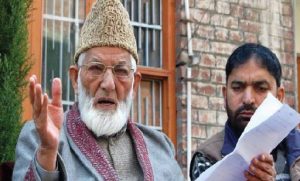 On June 30, in a development that took Kashmir by surprise, top separatist leader Syed Ali Shah Geelani resigned from his faction of Hurriyat Conference, a grouping he had founded in 2003 and which had elected him as its “chairman for life”. His resignation letter opened up a Pandora’s box. Geelani not only blamed some other leaders of abdicating their responsibility in the wake of the revocation of Article 370 last year but also accused the leaders of Pakistan chapter of Hurriyat of corruption.
On June 30, in a development that took Kashmir by surprise, top separatist leader Syed Ali Shah Geelani resigned from his faction of Hurriyat Conference, a grouping he had founded in 2003 and which had elected him as its “chairman for life”. His resignation letter opened up a Pandora’s box. Geelani not only blamed some other leaders of abdicating their responsibility in the wake of the revocation of Article 370 last year but also accused the leaders of Pakistan chapter of Hurriyat of corruption.
“When New Delhi merged J&K into its federation and divided it into two parts, those of our leaders who were not in jails were expected to guide and lead the people. I searched for you, tried to establish contact through messages, but the effort was not successful. You could not be found,” Geelani wrote in letter to his colleagues.
As for the Pakistani chapter of his faction, Geelani accused them of indiscipline, financial irregularities and cosying up to the establishment. “Azad Kashmir (PoK) branch is only a representative forum. It has no power to take an individual or collective decision, But over the past two years, we have received many complaints about the forum. The leaders have used their influence to gain access to corridors of power and actually participate in the government. Besides their involvement in infighting, malfeasance etc has been a subject of raging debate”.
The move has created a storm in separatist circles. This has left people guessing as to the reasons other than what Geelani has mentioned in the letter. One theory is the leader’s weakening grip on his faction of Hurriyat over the past one year which has also seen him grappling with health issues. The tipping point seems to have been the recent consultative meeting of the Hurriyat which bypassed him. Significantly the meeting was also attended by Geelani’s closest confidante Ashraf Sehrai whose militant son Junaid Sehrai was recently killed in a recent encounter in Srinagar.
In Pakistan too, Geelani’s man Syed Abdallah Geelani has been sidelined as the leader of the PoK chapter of Hurriyat, something that Geelani has deemed as affront to him as the chairman of the Hurriyat and hence his decision to resign.
The significance of the leader’s exit can be gauged from the fact that the senior BJP leader and the party’s J&K incharge Ram Madhav posted three successive tweets on the development.
However, Hurriyat itself has chosen silence over a formal response to Geelani. The resignation has confronted Hurriyat with a serious challenge. For one, with Geelani alienated, the Hurriyat, in his absence, will struggle with a credibility crisis, so will a new leader. Besides, Geelani’s charges of corruption and abdication of leadership in the period following the withdrawal of Article 370 will also haunt the Hurriyat.
That said, Hurriyat leader’s resignation has raised many a question. It is too extreme a step from him at a very critical time. So, there are more questions than answers. Many people have cast doubt on the authenticity of letters considering Geelani is believed to be very ill and not in a position to think through a major decision like the resignation. But publicly none from the Hurriyat or from his family has challenged the resignation letter.
While the letter slams the constituents of Geelani’s own faction, it stays short of criticizing the leaders of the parallel faction headed by Mirwaiz Umar Farooq. However, the leaders of Mirwaiz faction – Prof Abdul Ghani Bhat, Bilal Lone and Masroor Abbas Ansari — held a meeting to demand an end to political uncertainty. They also demanded release of Mirwaiz from the house arrest. This was the first such statement from the Mirwaiz Hurriyat after August 5 move and people attributed it, in part, to Geelani’s resignation.
However, considering Geelani is the first in the Valley’s separatist hierarchy, both in terms of his seniority and the political weight, the fallout of his resignation is unlikely to remain limited to his exit from Hurriyat.
letters@tehelka.com













